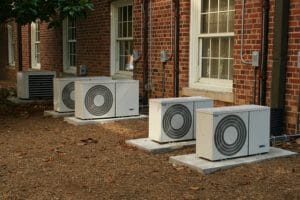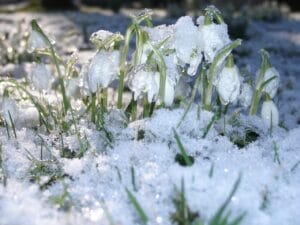
As spring settles in and the temperatures start rising around Charlottesville and Albemarle County, it’s time to give your HVAC system some much-needed attention. HVAC maintenance in spring is not just a routine task; it’s an essential step towards ensuring the efficiency and longevity of your system.
Regular maintenance of your HVAC system can save you from unpleasant surprises when the scorching heat of summer arrives. It also helps in identifying and resolving any potential issues before they turn into major breakdowns, ultimately saving you time, money, and discomfort.
Not only does spring HVAC maintenance keep your system running smoothly, but it also improves indoor air quality and reduces energy consumption. This can be especially valuable for those prone to seasonal allergies of plants coming into bloom. By cleaning and inspecting components such as filters, coils, and ducts, you can enhance the overall performance of your HVAC system, leading to better airflow and lower utility bills.
So, don’t wait for the first heatwave to hit before taking care of your HVAC system. Get ahead of the game and schedule your spring maintenance now. It’s a small investment that pays off in comfort and peace of mind throughout the summer months.
Schedule Spring HVAC Maintenance
- The importance of HVAC maintenance
- Understanding the seasonal impact on HVAC systems
- Benefits of spring HVAC maintenance
- Common HVAC issues in spring
- DIY HVAC maintenance tips for spring
- Hiring a professional HVAC technician for spring maintenance
- Spring HVAC maintenance checklist
- Cost-saving benefits of regular HVAC maintenance
- Signs that your HVAC system needs maintenance
The importance of HVAC maintenance
Proper HVAC maintenance is crucial to keep your system functioning optimally. Neglecting regular maintenance can lead to decreased efficiency, increased energy consumption, and a higher risk of system breakdowns. By investing in regular HVAC maintenance, you can avoid these issues and ensure the longevity of your system.
During the winter months, your HVAC system might have accumulated dust, dirt, and debris, which can hinder its performance. Spring maintenance allows you to clean and inspect the system, removing any buildup that could affect its efficiency. Additionally, routine maintenance helps identify any potential issues early on, preventing them from turning into expensive repairs down the line.
Regular HVAC maintenance also contributes to better indoor air quality. Over time, dust, allergens, and contaminants can accumulate in your HVAC system, leading to poor air quality and potential health issues. By cleaning or replacing filters, cleaning ducts, and inspecting components, you can reduce the presence of pollutants in your indoor air.
Understanding the seasonal impact on HVAC systems
Different seasons have varying effects on HVAC systems. In spring, transitioning from the colder months to warmer weather brings about certain challenges for your system.
During winter, your HVAC system works hard to keep your home warm, and this can take a toll on its components. As spring arrives, the warmer temperatures require your system to switch from heating to cooling mode. This transition can strain the system, especially if it hasn’t been properly maintained.
Spring is also a time when allergies are at their peak. Pollen, dust, and other allergens can find their way into your HVAC system, affecting its performance and contributing to poor indoor air quality. Regular maintenance can address these issues, ensuring that your system is ready to tackle the challenges of spring.

Benefits of spring HVAC maintenance
There are several benefits to performing HVAC maintenance in the spring:
- Improved system efficiency: By cleaning and inspecting components such as filters, coils, and ducts, you can enhance the overall performance of your HVAC system. This leads to better airflow, improved energy efficiency, and lower utility bills.
- Extended system lifespan: Regular maintenance helps identify and address potential issues before they escalate into major problems. By catching problems early on, you can extend the lifespan of your HVAC system and avoid costly repairs or premature replacements.
- Enhanced indoor air quality: Spring maintenance involves cleaning or replacing air filters, removing dust and debris from the system, and inspecting ductwork. These actions contribute to better indoor air quality, reducing the presence of allergens and improving the overall comfort of your home. And of course there are always air quality improvement options if needed.
- Reduced energy consumption: A well-maintained HVAC system operates more efficiently, resulting in lower energy consumption. This not only benefits the environment but also reduces your monthly utility bills.
Common HVAC issues in spring
As spring arrives, certain HVAC issues become more common. Being aware of these issues can help you address them promptly and prevent any major disruptions to your comfort.
- Clogged air filters: Over the winter months, air filters can become clogged with dust, debris, and pet dander. This reduces airflow and puts strain on the system. Regularly cleaning or replacing air filters can prevent this issue and improve system efficiency.
- Refrigerant leaks: Warmer temperatures in spring require your air conditioning system to work harder. If your system has a refrigerant leak, it may struggle to cool your home efficiently. Professional maintenance can detect and repair any refrigerant leaks, ensuring optimal cooling performance.
- Thermostat issues: After a long winter, your thermostat may need recalibration or battery replacement. This ensures accurate temperature readings and proper functioning of your HVAC system.
- Ductwork problems: Over time, ductwork can develop leaks or become blocked by debris. This can lead to inefficient heating or cooling and poor indoor air quality. Professional maintenance can identify and address any issues with your ductwork.
DIY HVAC maintenance tips for spring
While professional HVAC maintenance is essential, there are also some steps you can take on your own to keep your system running smoothly in spring:
- Clean or replace air filters: Dirty air filters can impede airflow and reduce system efficiency. Check your filters regularly and clean or replace them as needed.
- Clear debris around outdoor units: Remove any leaves, twigs, or other debris that may have accumulated around your outdoor HVAC unit. This ensures proper airflow and prevents damage to the unit. Over the winter homeowners tend to stay indoors and not walk around their property as much. So look around your outdoor unit and ensure there is no damage from outdoor winter conditions, or any new critters that have taken up residency inside the unit.
- Check and clean condenser coils: Over time, condenser coils can become dirty, affecting the efficiency of your air conditioning system. Use a soft brush or vacuum to remove any debris from the coils.
- Inspect ductwork: Look for any visible signs of leaks or damage in your ductwork. Seal any leaks with duct tape or contact a professional for repairs.
Hiring a professional HVAC technician for spring maintenance
While DIY maintenance is beneficial, hiring a professional HVAC technician for spring maintenance is highly recommended. We have the expertise and tools to thoroughly inspect and clean your system, ensuring that it is in optimal condition for the upcoming season.
A professional technician will perform a comprehensive inspection, checking for any issues that may affect the performance of your HVAC system. They will clean components, lubricate moving parts, check refrigerant levels, and perform any necessary repairs or adjustments.
By hiring a professional, you can have peace of mind knowing that your HVAC system is in the hands of a qualified expert. They can identify and address potential problems that you may not be aware of, ultimately saving you from costly breakdowns and ensuring the longevity of your system.
Spring HVAC maintenance checklist

Here is a checklist of tasks that should be included in your spring HVAC maintenance routine:
- Clean or replace air filters.
- Check and clean condenser coils.
- Inspect and clean evaporator coils.
- Clean and clear debris around outdoor units.
- Lubricate moving parts.
- Check refrigerant levels and adjust if necessary.
- Inspect and clean ductwork.
- Test thermostat accuracy and replace batteries.
- Tighten electrical connections.
- Inspect and clean blower motor and fan blades.
By following this checklist and scheduling professional maintenance, you can ensure that your HVAC system is in top shape for the spring and summer months.
Cost-saving benefits of regular HVAC maintenance
Investing in regular HVAC maintenance plans may seem like an additional expense, but it can save you money in the long run. Here are some cost-saving benefits of regular maintenance:
- Avoid costly repairs: Regular maintenance allows for the early detection and resolution of potential issues. By addressing these issues before they escalate, you can avoid costly repairs or system breakdowns that may require emergency service.
- Extend system lifespan: A well-maintained HVAC system lasts longer. By taking care of your system through regular maintenance, you can delay the need for expensive replacements and get the most out of your investment.
- Improved energy efficiency: A properly maintained HVAC system operates more efficiently, reducing energy consumption and lowering your monthly utility bills. The cost savings over time can outweigh the expense of regular maintenance.
- Warranty protection: Some HVAC manufacturers require regular maintenance as a condition for warranty coverage. By adhering to maintenance requirements, you can ensure that any potential repairs or replacements are covered by the warranty, saving you money on parts and labor.
Signs that your HVAC system needs maintenance
While regular maintenance is crucial, there are also signs that your HVAC system may need immediate attention. If you notice any of the following signs, it’s time to schedule maintenance:
- Insufficient cooling or heating: If your HVAC system is struggling to reach the desired temperature or is unevenly cooling or heating your home, it may be a sign of underlying issues that require professional attention.
- Strange noises: Unusual noises such as grinding, squealing, or banging coming from your HVAC system could indicate a mechanical problem. Ignoring these noises may lead to further damage if not addressed promptly.
- Increased energy bills: A sudden spike in your energy bills without a corresponding increase in usage may indicate that your HVAC system is operating inefficiently. Professional maintenance can help identify the cause and restore efficiency.
- Frequent system cycling: If your HVAC system is constantly turning on and off, it may be a sign of an underlying issue that needs to be addressed. This can lead to increased wear and tear on the system if left unattended.
You can always wait until summer…
And see what the first heatwave does your HVAC system. You’ll probably be fine. But neglecting maintenance will also increase your odds of joining an exclusive group of hot and irritated homeowners desperate for same-day Charlottesville HVAC service to get their air conditioning working again. I think we’d both agree – it’s a group you’d rather not be a part of. Schedule your spring maintenance now and enjoy a cool and comfortable home throughout the summer months. It’s a small investment that pays off in comfort, peace of mind, and cost savings.
Spring HVAC maintenance is not just a routine task; it’s a crucial step towards ensuring the efficiency, longevity, and comfort of your HVAC system. By investing in regular maintenance, you can avoid costly breakdowns, improve indoor air quality, reduce energy consumption, and extend the lifespan of your system.




